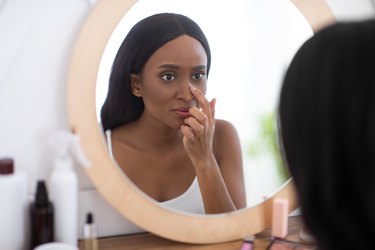
You're far more likely to get a blemish on your nose than in it. But a pimple inside your nose can be weirdly painful and distracting, so if you've got one, you're probably wondering what you can do to get rid of it. (And whether it's something you need to be worried about.)
Here's the deal: Pimples in your nostril, while uncomfortable, aren't generally cause for major concern. But you still shouldn't try to pop it at home, says Marisa Garshick, MD, assistant clinical professor of dermatology at Cornell-New York Presbyterian Medical Center.
Video of the Day
Video of the Day
Here's what to do instead, plus the habits that can make pimples inside of the nose more likely.
What Causes Pimples in the Nose?
Nostril pimples — what experts call nasal vestibulitis — are basically little mounds of irritated or infected tissue. "A pimple inside the nose can result from inflammation of a hair follicle, which are present inside the nose, or as a result of clogged pores or oil glands," Dr. Garshick explains.
It's possible for these pimples to form at random. But they're more often the result of plucking your nasal hairs, frequently picking or blowing your nose, or even having a nasal piercing, according to October 2017 findings in Diagnostic Microbiology and Infectious Disease.
Pimples in the nose are also more likely to strike in people who are immunocompromised or who have diabetes, Dr. Garshick notes. In other words? If you have a condition that makes you more susceptible to infections, you may be more likely to develop nostril pimples.
Are Pimples in the Nose Ever Serious?
Pimples that form in the nostril are usually annoying, but they're not often a big deal.
"In some cases they will go down on their own," Dr. Garshick says.
That said, serious complications can sometimes happen. If the pimple becomes infected, it's possible for the infection to travel through the veins in the face up to the brain, according to Merck Manuals. And infections that spread to the brain have the potential to become life-threatening.
So, What Should You Do About Them?
Sometimes a small pimple inside the nose will clear up on its own. If the area is easily accessible (in other words, right near the edge of your nostril), applying a warm compress can be soothing.
Resist the urge to pop the pimple, pick at it or even touch it. Popping pimples can create more inflammation and lead to additional breakouts, Dr. Garshick says. More seriously, it can potentially cause an infection within the pimple to spread to areas like the brain, she warns. Touching a pimple in your nose can cause more inflammation and introduce bacteria.
"If the bump or pimple isn't going away or if there is increasing pain or tenderness, you should see your doctor," Dr. Garshick says. "Experiencing symptoms like fever or swelling are also reasons to see a medical professional."
In that case, antibiotic ointments like bacitracin or mupirocin may be needed to clear the infection, per Merck Manuals.
How Can You Prevent Pimples in the Nose?
The best way to keep nostril pimples from forming is by keeping tweezers and fingers out of your nose. "Avoiding picking at the nose or attempting any type of nose hair removal," Dr. Garshick recommends. (If you have a deep, hard booger that just won't go away, here's a better way to dislodge it.)
If recurring pimples are still a problem, they could be related to excess bacteria in your nostrils, Dr. Garshick says. Keeping the area clean with a warm washcloth and mild soap can help sweep away dirt and germs and make pimples less likely to form. A doctor may also prescribe topical antibiotics to reduce bacteria in the area.
Tip
Removing nose hairs can lead to ingrown hairs (just like it can on other parts of the body), which can also create nasal pimples. If you need to use a nose hair removal device, it's important to clean it before and after every use.
When to See a Doctor
You should see your dermatologist for pesky nostril pimples that keep coming back. "Given the location in the nose can sometimes be hard to see, it's best to see someone who can evaluate the pimples and determine what's causing them," Dr. Garshick says.
You should also make an appointment if you have any of the following symptoms:
- Fever
- Increasing pain or tenderness
- Swelling
Is this an emergency? If you are experiencing serious medical symptoms, please see the National Library of Medicine’s list of signs you need emergency medical attention or call 911.